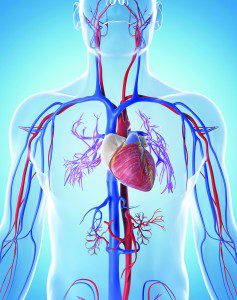By Erick E. Calderon, M.D., FACC, FSCAI
 Several health conditions, your lifestyle, and your age and family history can increase your risk for heart disease. These are called risk factors. About three quarters of all Americans (73%) have at least one of the seven key risk factors for heart disease: high blood pressure, high cholesterol, smoking, obesity, family history, diabetes and inactive lifestyle for males older than 55 and females older than 65.
Several health conditions, your lifestyle, and your age and family history can increase your risk for heart disease. These are called risk factors. About three quarters of all Americans (73%) have at least one of the seven key risk factors for heart disease: high blood pressure, high cholesterol, smoking, obesity, family history, diabetes and inactive lifestyle for males older than 55 and females older than 65.
Some of the risk factors for heart disease cannot be controlled, such as your age or family history. But you can take steps to lower your risk by changing the factors you can control.
High Blood Pressure
High blood pressure is a major risk factor for heart disease. It is a medical condition that occurs when the pressure of the blood in your arteries and other blood vessels is too high. The high pressure, if not controlled, can affect your heart and other major organs of your body, including your kidneys and brain.
High blood pressure is often called a “silent killer” because many people do not notice symptoms to signal high blood pressure. Lowering blood pressure by changes in lifestyle or by medication can reduce your risk for heart disease and heart attack.
High Cholesterol
Cholesterol is a waxy, fat-like substance made by the liver or found in certain foods. Your liver makes enough for your body’s needs, but we often get more cholesterol from the foods we eat. If we take in more cholesterol than the body can use, the extra cholesterol can build up in the walls of the arteries, including those of the heart. This leads to narrowing of the arteries and can decrease the blood flow to the heart, brain, kidneys, and other parts of the body.
Some cholesterol is “good,” and some is “bad.” High cholesterol is the term used for high levels of low-density lipoprotein, or LDL, which are considered “bad” because they can lead to heart disease. A higher level of high-density lipoprotein cholesterol, or HDL, is considered “good” because it provides some protection against heart disease.
A blood test can detect the amount of cholesterol and triglycerides (a related kind of fat) in your blood.
Diabetes
Diabetes mellitus also increases the risk for heart disease. Your body needs glucose (sugar) for energy. Insulin is a hormone made in the pancreas that helps move glucose from the food you eat to your body’s cells. If you have diabetes, your body doesn’t make enough insulin, can’t use its own insulin as well as it should, or both.
Diabetes causes sugars to build up in the blood. The risk of death from heart disease for adults with diabetes is two to four times higher than adults who do not have diabetes. Talk to your doctor about ways to manage diabetes and control other risk factors.
Unhealthy Diet
Diets high in saturated fats, trans fat, and cholesterol have been linked to heart disease and related conditions, such as atherosclerosis. Also, too much salt (sodium) in the diet can raise blood pressure levels.
Physical Inactivity
Not getting enough physical activity can lead to heart disease. It also can increase the chances of having other medical conditions that are risk factors, including obesity, high blood pressure, high cholesterol, and diabetes. Regular physical activity can lower your risk for heart disease.
Obesity
Obesity is excess body fat. Obesity is linked to higher “bad” cholesterol and triglyceride levels and to lower “good” cholesterol levels. In addition to heart disease, obesity can also lead to high blood pressure and diabetes. Talk to your health care team about a plan to reduce your weight to a healthy level.
Too Much Alcohol
Drinking too much alcohol can raise blood pressure levels and the risk for heart disease. It also increases levels of triglycerides, a form of cholesterol, which can harden your arteries. Women should have no more than 1 drink a day. Men should have no more than 2 drinks a day.
Tobacco Use
Tobacco use increases the risk for heart disease and heart attack. Cigarette smoking can damage the heart and blood vessels, which increases your risk for heart conditions such as atherosclerosis and heart attack. Also, nicotine raises blood pressure, and carbon monoxide reduces the amount of oxygen that your blood can carry. Exposure to other people’s secondhand smoke can increase the risk for heart disease even for nonsmokers.
Although heart disease is a leading cause of death among Americans, you can reduce your risk of developing problems. Prevent heart disease by making healthy choices and managing any health conditions you may have. For more information call Lakewood Cardiovascular Consultants at 941-907-1113.
Erick E. Calderon, MD, FACC, FSCAI
Dr. Calderon is a board certified cardiologist. He attended Francisco Marroquin University in Guatemala followed by resi-
dencies and fellowship at University of Tennessee School of Medicine in Memphis, TN.
Certifications:
– Board Certified in Internal Medicine
– Diplomate of the American Board of
Nuclear Cardiology
– Fellow of the American College of Cardiology
– Fellow of the American Society of Coronary Angiography and Intervention.
Dr. Calderon brings national expertise in the diagnosis, medical and minimally invasive approach to Cardiovascular Diseases. He is a member of the American Medical Association, American College of Cardiology, American Heart Association and Manatee County Chamber of Commerce.
Call To Schedule Your Appointment Today!
(941) 907-1113









